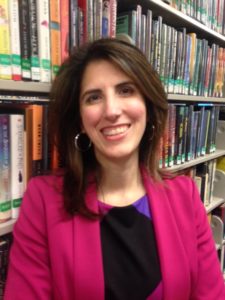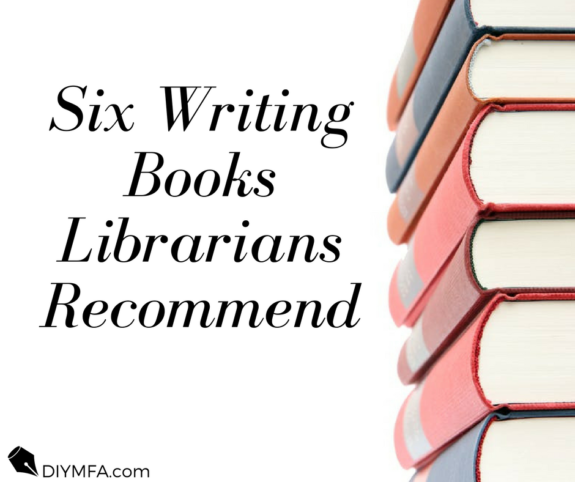In my neck of the woods, it’s fall–time for flannel shirts, warm apple cider and reading up on my craft. Yes, that’s right, I’ll be reading rather than writing more. I prefer to throw myself into a more grueling writing schedule during January when there’s six inches of snow on the ground and a wind chill in the negative numbers. But, I do use the autumn season to prepare for this time. When the leaves resemble vintage wines, that’s my cue to put down the beach reads and instead read a book or two on writing.
In fact, it was this time last year that I read DIYMFA: Write with Focus, Read with Purpose, Build Your Community by this website’s founder Gabriela Pereira. And here I am, only one year later, writing a regular column for the companion website. If you only stumbled on this site and didn’t realize it was based on Gabriela’s book, make IT the writing book you read this Fall. It’s extremely practical and well-structured and I flew through it in just a few days.
DIYMFA.com is chock full of articles about favorite writing books and I’ve listed some of our greatest hits at the end of this article. In the meantime, I thought it would be fun (and interesting) to hear which books librarians routinely recommend to writers. The questions below are actual ones I’ve received from writers (with names removed of course!) and the corresponding book I recommended.
Try one, and if it doesn’t speak to your truth, try another until you find one that does.
Question: I had a dream I was writing a book. How do I get started?
Recommendation: Writer’s Market 2018
Nicknamed the most trusted guide to getting published, this book for beginning or advanced writers is in its 97th annual edition. Beginners can read chapters in the “Finding Work” section such as “Query Letter Clinic.” For more seasoned authors, there are essays on “Managing Work” covering advanced topics like promotion. Most of the book provides an overview of the publishing industry with listings of literary agencies, book publishers, and magazines that accept submissions from freelancers. For instance, the current edition lists an inflight magazine called “Horizon” that pays $100 minimum per accepted article. Similar titles from the same publisher include Poet’s Market, Children’s Writers & Illustrator’s Market, Songwriter’s Market, and Novel & Short Story Writer’s Market.
Question: I’m participating in NaNoWriMo in November. Do you have anything that will help me prepare?
Recommendation: No Plot? No Problem! Revised and Expanded Edition: A Low Stress, High-Velocity Guide to Writing a Novel in 30 Days by Chris Baty
This was the book that started the NaNoWriMo movement. If you’ve never participated in NaNoWriMo or even if you have, you owe it to yourself to read this book. The author provides week-by-week checklists to realistically complete a novel in a month. Spoiler alert: The editing process takes place over the next year.
Question: I wrote an engineering manual and need to find agents, publishers and proofreaders specializing in technical writing or textbooks.
Recommendation: Literary Market Place
LMP is an in-depth, two volume directory of publishers, literary agents and other professionals employed by writers including proofreaders, translators, and editors. Multiple indexes help you locate publishers with specialties such as “travel & tourism” or “academic textbooks.” Literary agencies list their current wish lists (e.g. health related nonfiction) and submission guidelines (“Paste word count and summary into body of an e-mail, no attachments.”). Tip: Once you’ve found a few contenders, it’s always best to confirm the information by going to the corresponding website and checking under “submission guidelines.” Finally, LMP is a great source of awards, prize contests, fellowships and grants for writers. Did you know the Edna Staebler Award for Creative Nonfiction was started to encourage new Canadian authors by giving winners $10,000?
Question: My writing group said they didn’t connect with my plot. Any suggestions?
Recommendation: The Seven Basic Plots by Christopher Booker
Rags to Riches, The Quest, Overcoming the Monster. There’s a reason stories with these themes are timeless and adored by all ages. After covering all the basic plots with examples, the author shares his views about how today’s writers have lost their way and how they can get back on track. Warning: This book is thick and, at first glance, you’ll wonder if it covers more than seven plots. Yet, the chapters are short, sub-divided into two to three-page snapshots, and so vivid you’ll feel like you’re reading a great story rather than a writing manual. Plus, you’ve got to love the author’s last name.
Question: I’m a veteran, retiree, world traveler, etc., and want to write a memoir of my experiences. What’s a good book I could read?
Recommendation: Storycraft: The Complete Guide to Writing Narrative Nonfiction by Jack Hart
I’m amazed that I find this book at even the tiniest libraries and bookstores. Filled with outstanding visual diagrams, journalist and award-winning professor Hart masterly teaches that the best way to create memorable nonfiction is to borrow devices from fiction (point of view, character, scene and dialogue.)
Question: What will you be reading this fall?
Answer: I’ll be reading The Thirty-Six Dramatic Situations by Mike Figgis.
George Polti wrote the original book in the 1800’s using examples from French plays of the day. When Oscar-nominated screenwriter and director Figgis read it, he couldn’t believe how much his creativity increased. He’s updated it for today’s writers using modern-day references. I’m also looking forward to the October release of Amy Tan’s Where the Past Begins: A Writer’s Memoir.
For other ideas, check out previous DIYMFA.com columns:
- Essential Reading List: Must-Read Books for Your Writing Library by Gabriela Pereira
- #5onFri: Five Tips for Reading Like a Writer by Kolina Cicero
- #5onFri: Five Books to Help You Craft a Stronger Narrative by Elisabeth Kauffmann
- Top 10 Book Picks by Rebecca Ann Jordan
And from BookRiot:
 Terri Frank is a professional librarian and holds a Master’s degree in library and information science from the University of Michigan. When she’s not working in a library, she’s probably visiting a library with her husband and two kids. Her current writing projects include a novel about a tuberculosis sanitorium.
Terri Frank is a professional librarian and holds a Master’s degree in library and information science from the University of Michigan. When she’s not working in a library, she’s probably visiting a library with her husband and two kids. Her current writing projects include a novel about a tuberculosis sanitorium.







